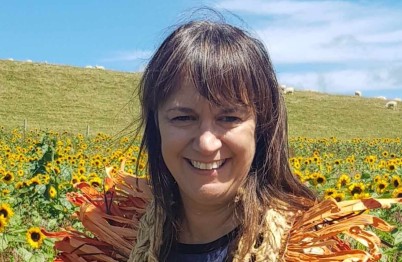The Health Research Council of New Zealand (HRC) has awarded its inaugural Te Ata Hāpara Award to an emerging researcher whose growing leadership in kaupapa Māori research and indigenous health promotion is influencing health policy and practice at a national, community and whānau level.
Dr Angelique Reweti (Ngāpuhi) from Te Kunenga ki Pūrehuroa Massey University received the HRC Te Ata Hāpara Award for her contribution to advancing Māori health as an emerging researcher at the final Royal Society Te Apārangi Research Honours event for 2025 in Wellington this evening.
HRC Director of Investments and Co-Chief Executive (acting) Mr Stacey Pene says te ata hāpara (the dawn) signifies the dawning of the next generation of Māori health research leaders.
“Angelique’s research bridges academic excellence and real-world impact. In only a short time since completing her studies, she has become sought-after for her leadership in kaupapa Māori health research and health promotion curriculum development. Alongside her roles as chair of the Māori Caucus and a member of the Executive Council for the Public Health Association of New Zealand, Angelique’s work is having a tangible impact within communities, institutions and the wider health sector,” says Mr Pene.
Angelique began her academic and research career at age 36, earning a first-class honours degree in Māori health and completing her doctorate in 2022. The first in her whānau to attend university, Angelique says her journey has been shaped by her desire to change the health system to make space for whānau voices, knowledge and aspirations.
“When I finished my undergraduate degree, I had just had my first child. I didn’t want them to hear all these negative statistics and equate that to what it is to be Māori. That inspired me to further my studies so I could help shift that narrative and shine a light on what’s working for Māori, backing that up with evidence to influence policy, practice and community action.”
Angelique works alongside her whānau and hapū in Te Tai Tokerau through kaupapa Māori research that secures connections to marae and whenua. She says her work restores identity and belonging, affirming that wellbeing begins with knowing who we are and where we come from.
At a national level, Angelique co-leads Wāhi Kōrero, an online story sharing platform with over 800 stories that reveal hidden barriers to healthcare, offering important insights that have directly influenced Te Whatu Ora’s redesign of child growth and development services through Kahu Taurima.
Insights highlighting whānau needs for better support with sleeping, feeding and maternal mental health – as well as themes of whakamā (embarrassment) and engagement – have also contributed to capability building within the Well Child workforce. This has included professional development workshops with Well Child nurses and providers, supporting reflective practice and strengthening whānau-centred care.
Going forward, Angelique says her team plans to use this platform to help influence changes in the design of the health system and provide pathways to ensure that whānau voices are integrated throughout to create a more equitable and culturally grounded health future.
“My goal is to reassert Māori ways of knowing, ensuring communities are not just participants in research, but partners and leaders in defining the issues, generating the evidence and shaping their own solutions to drive meaningful change in health and wellbeing,” says Angelique.
For information about the recipients of the HRC’s other awards for 2025, which were presented recently at Royal Society Te Apārangi Research Honours events in Christchurch and Auckland, see below.
2025 Liley Medal: Awarded to Professor Logan Walker from the University of Otago, lead author on a paper, published in the American Journal of Human Genetics, that has helped integrate complex RNA splicing biology into practical clinical recommendations that are now being used by major diagnostic laboratories in New Zealand and internationally.
2025 – Beaven Medal (first joint award): Awarded to Professor Ben Wheeler, Associate Professor Martin de Bock and team from the University of Otago, for their research and collaborations with industry that have directly driven the nationwide adoption of automated insulin delivery and continuous glucose monitoring, transforming type 1 diabetes care in New Zealand and influencing global practice.
2025 – Catalyst in the Community Award (inaugural): Presented to the research team from Te Rūnanga o Ōtākou Taurite Tū Limited, whose Taurite Tū programme, a uniquely Māori approach to falls prevention rooted in both western science and traditional Māori practices, has significantly reduced falls risk and injury rates for Māori aged 55-plus.
2025 – Beaven Medal (second joint award): Awarded to Professor Alice Theadom and the Brain Injury Screening Tool Development Group from Auckland University of Technology for developing a free clinical tool, now in use in primary care and hospital services throughout New Zealand, to help clinicians identify people aged 8 years or over who are at risk of a poor recovery following a mild traumatic brain injury, and facilitate their referral to ACC-funded concussion services early.
2025 – Te Tohu Rapuora Medal:Awarded to Paora Moyle, KSO, and the team at Te Whāriki Manawāhine o Hauraki for their research centred on gathering the lived experiences of wāhine Māori, takatāpui, gang whānau, and survivors of harm in state care, including their landmark ‘Hauraki Whānau Voices’ research programme that has influenced social policy development and community projects throughout New Zealand.
